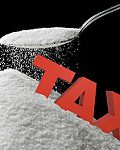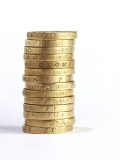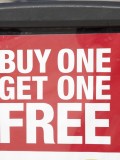Our work on changing economic environments:
At the BHRU, we study interventions that can influence prices or income and hence change the financial advantages or disadvantages people face when making choices relating to tobacco, alcohol, healthier or less healthy foods, and physical activity.
These interventions include the use of taxes, subsidies or income transfers, as well as retail practices such as sales promotions.
Click on the images below to find out more about the work we are doing in this area:
Key Studies:
We found that a 10% increase in the price of sweet snacks could lead to a similar reduction in consumer demand as the same price increase for sugar-sweetened drinks. However, such a price increase is estimated to have knock-on effects that may further reduce purchases of sugar-sweetened drinks and other snacks. Furthermore, as sweet snacks provide twice as much sugar in the diet as sugar-sweetened drinks, the overall reduction on sugar intake could be even greater than that observed with price increases for sugar-sweetened drinks. Are sweet snacks more sensitive to price increases than sugar-sweetened beverages: analysis of British food purchase data. Smith, Cornelsen, Quirmbach, Jebb, Marteau, 2018. This study looked at how increasing the price of non-alcoholic drinks could influence purchases of alcoholic drinks, such as beer, wine and cider, in supermarkets. We found that increasing the price of sugary drinks could increase purchases of lager, while increases in the price of diet drinks could increase purchases of beer, cider and wines. Effect of increasing the price of sugar-sweetened beverages on alcoholic beverage purchases: an economic analysis of sales data. Quirmbach, Cornelsen, Jebb, Marteau, Smith, 2018. Would taxing sweet snacks bring greater health benefits than taxing sugar-sweetened drinks?
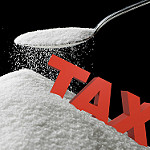 In April 2018, the UK Government introduced a levy on sugary drink producers. Our study looks at whether increasing the price of sweet snacks would be as effective.
In April 2018, the UK Government introduced a levy on sugary drink producers. Our study looks at whether increasing the price of sweet snacks would be as effective.Would increasing the price of sugary soft drinks influence purchases of alcohol?
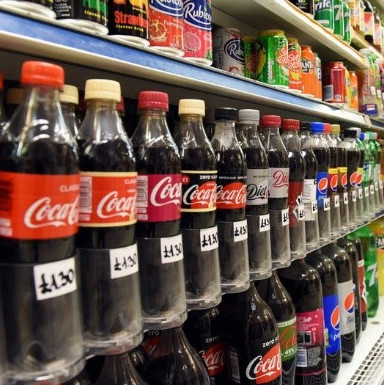 The UK Government levy on sugary drinks producers began in April 2018, potentially influencing the cost of a large range of non-alcoholic beverages.
The UK Government levy on sugary drinks producers began in April 2018, potentially influencing the cost of a large range of non-alcoholic beverages.
Are sweet snacks more sensitive to price increases than sugar-sweetened beverages: analysis of British food purchase data. (2018). Smith RD, Cornelsen L, Quirmbach D, Jebb SA, Marteau TM. BMJ open. In this focus group study, three themes emerged for the low acceptability of price increases to reduce consumption of alcohol and fast foods: Highlighting evidence of intervention effectiveness might increase the acceptability of price interventions. Public attitudes towards pricing policies to change health-related behaviours: a UK focus group study. Somerville, Marteau, Kinmonth & Cohn, 2015. This evidence suggests that whilst policies targeting promotions on less healthy foods might help people to have healthier shopping baskets, they would have little effect on reducing health inequalities caused by deprivation. Price promotions on healthier vs. less healthy foods: a hierarchical regression analysis of the impact on sales and social patterning of responses to promotions in Great Britain. Nakamura, Suhrcke, Jebb, Pechey, Almiron-Roig, Marteau, 2015. While our study found differences in acceptability depending on intervention type (affecting price, availability or advertising), acceptability increased when information on effectiveness was given. Acceptability increased most for minimum unit pricing, which had greater effectiveness in terms of expected outcomes compared with the other intervention types. Highlighting the effectiveness of interventions could increase their acceptability. Public acceptability of population-level interventions to reduce alcohol consumption: A discrete choice experiment. Pechey, Burge, Mentzakis, Suhrcke & Marteau. 2014. Taxing sweet snacks may bring even greater health benefits than taxing sugar-sweetened drinks
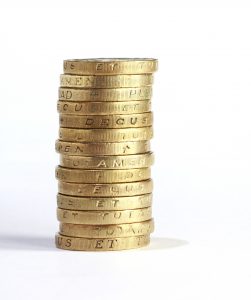 The UK Government levy on sugary drinks producers started in April 2018. This will potentially influence the cost of a large range of non-alcoholic beverages. Our new study (published 26th April 2018) looks at how increasing the price of snack foods might compare in impact. We found that a 10% increase in the price of sweet snacks could lead to a similar reduction in consumer demand as the same price increase for sugar-sweetened drinks. However, such a price increase is estimated to have knock-on effects that may further reduce purchases of sugar-sweetened drinks and other snacks. Furthermore, as sweet snacks provide twice as much sugar in the diet as sugar-sweetened drinks, the overall reduction on sugar intake could be even greater than that observed with price increases for sugar-sweetened drinks.
The UK Government levy on sugary drinks producers started in April 2018. This will potentially influence the cost of a large range of non-alcoholic beverages. Our new study (published 26th April 2018) looks at how increasing the price of snack foods might compare in impact. We found that a 10% increase in the price of sweet snacks could lead to a similar reduction in consumer demand as the same price increase for sugar-sweetened drinks. However, such a price increase is estimated to have knock-on effects that may further reduce purchases of sugar-sweetened drinks and other snacks. Furthermore, as sweet snacks provide twice as much sugar in the diet as sugar-sweetened drinks, the overall reduction on sugar intake could be even greater than that observed with price increases for sugar-sweetened drinks.Why don’t people like government increasing prices on unhealthy items?
 Price interventions can be one of the most effective ways of changing behaviour – particularly for reducing consumption of tobacco and alcohol – but public support for these interventions is usually low.
Price interventions can be one of the most effective ways of changing behaviour – particularly for reducing consumption of tobacco and alcohol – but public support for these interventions is usually low.
Are more deprived households likely to buy supermarket promotions?
 In our study which looked at price promotions in stores, we found that people were more likely to purchase less-healthy food items on promotion, rather than healthier items, and that less deprived households were more likely to buy foods on promotion than more deprived households.
In our study which looked at price promotions in stores, we found that people were more likely to purchase less-healthy food items on promotion, rather than healthier items, and that less deprived households were more likely to buy foods on promotion than more deprived households.How acceptable are pricing policies for changing behaviour?
 How acceptable people find different interventions to reduce alcohol consumption varies depending on the type of intervention and its effectiveness.
How acceptable people find different interventions to reduce alcohol consumption varies depending on the type of intervention and its effectiveness.
Publications related to changing economic environments:
2019
2018
2017
2015
2014
2013

